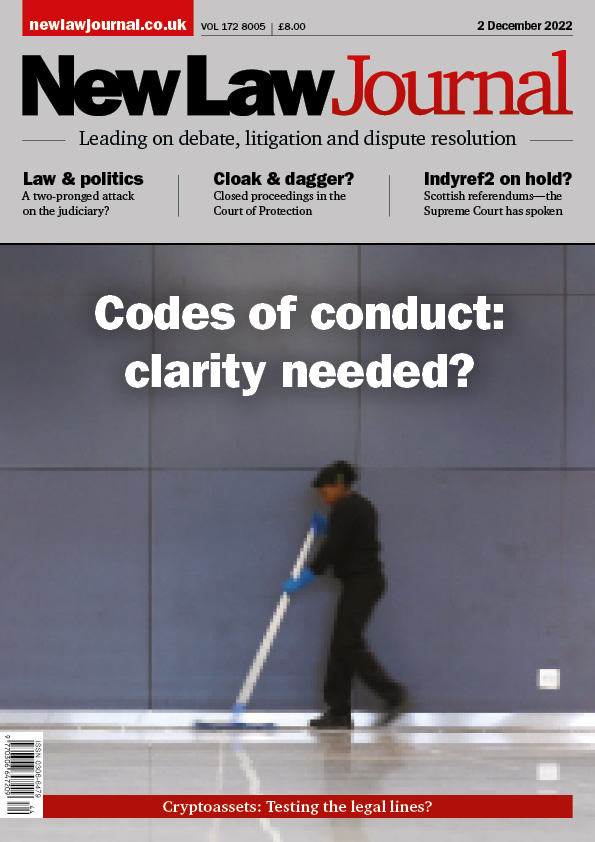THIS ISSUE

The cleaner did it! John Gould considers the rules & responsibilities which apply to non-solicitor employees of a firm
Andy Cullwick considers how law firms are facing up to an uncertain future, & how they can best adapt to it
David Jones & Evie Meleagros consider the progress & challenges of cryptoasset cases in the courts of England & Wales
Spying on your government is bad enough… but writing a book about it? Athelstane Aamodt explains why things are not always as they seem
Law firms have been warned again not to use litigation aimed at silencing critics—known as strategic lawsuits against public participation (SLAPPs).
A criminal offence of sharing ‘deepfakes’—explicit images or videos which have been manipulated to look like someone without their consent—is to be added to the Online Safety Bill, in a Ministry of Justice (MoJ) amendment.
An anonymous party known only as ‘Cøbra’ cannot take part in legal proceedings in England and Wales, the High Court has confirmed in a ground-breaking decision.
The Supreme Court’s decision regarding a draft Scottish Independence Referendum Bill will ‘not have come as a surprise’ to the first minister, according to public law specialist Stephen Parkinson.
The Lord Chief Justice, Lord Burnett, is to retire on 30 September 2023, after six years in post.
Ten firms out of 40 taking part in a Solicitors Regulation Authority (SRA) thematic review of immigration services providers have been referred to disciplinary processes after ‘significant shortcomings’ were found.
MOVERS & SHAKERS

Hugh James—Jonathan Askin
London corporate and commercial team announces partner appointment

Michelman Robinson—Daniel Burbeary
Firm names partner as London office managing partner

Kingsley Napley—Jonathan Grimes
Firm appoints new head of criminal litigation team
NEWS
Personal injury lawyers have welcomed a government U-turn on a ‘substantial prejudice’ defence that risked enabling defendants in child sexual abuse civil cases to have proceedings against them dropped
Children can claim for ‘lost years’ damages in personal injury cases, the Supreme Court has held in a landmark judgment
Holiday lets may promise easy returns, but restrictive covenants can swiftly scupper plans. Writing in NLJ this week, Andrew Francis of Serle Court recounts how covenants limiting use to a ‘private dwelling house’ or ‘private residence’ have repeatedly defeated short-term letting schemes
Artificial intelligence (AI) is already embedded in the civil courts, but regulation lags behind practice. Writing in NLJ this week, Ben Roe of Baker McKenzie charts a landscape where AI assists with transcription, case management and document handling, yet raises acute concerns over evidence, advocacy and even judgment-writing
The cab-rank rule remains a bulwark of the rule of law, yet lawyers are increasingly judged by their clients’ causes. Writing in NLJ this week, Ian McDougall, president of the LexisNexis Rule of Law Foundation, warns that conflating representation with endorsement is a ‘clear and present danger’








